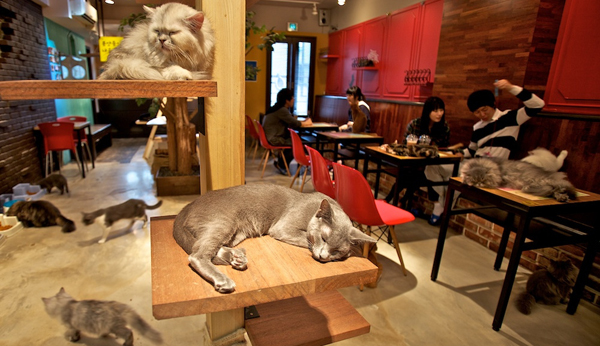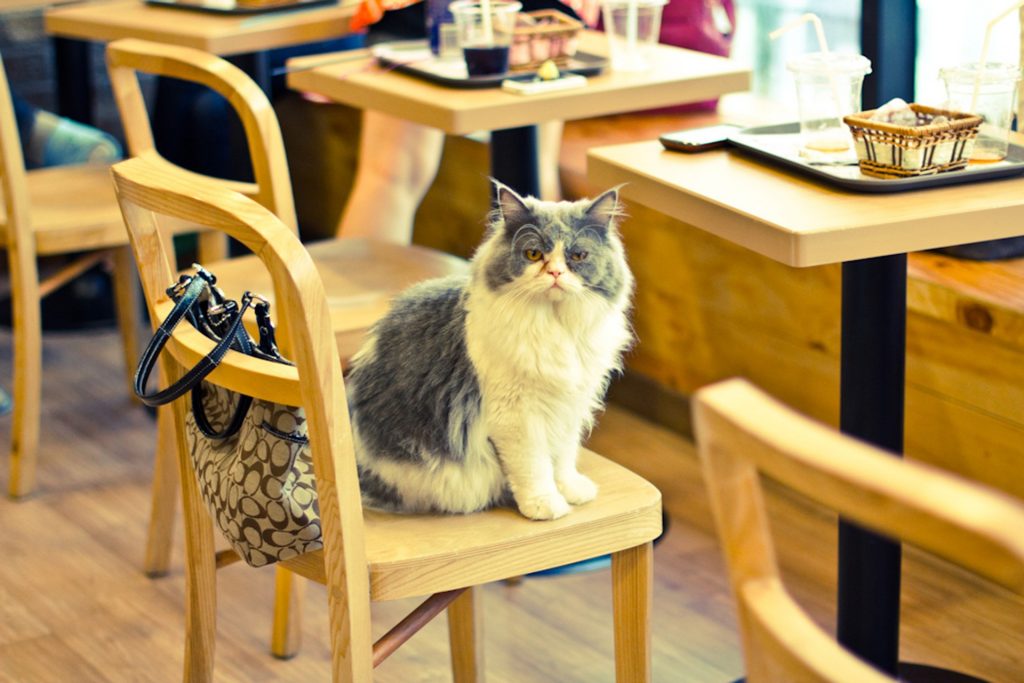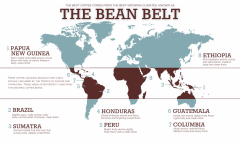Is the cat coffee environment really suitable for cat people?
Professional barista communication, please pay attention to coffee workshop (Weixin Official Accounts cafe_style )
Cats can be said to be the most suitable pets for this busy generation. Their elegant and silly every move always captures our troubled hearts. I don't know,"cat slave","cat person" and other words have become common terms in life, all kinds of phenomena explain the popularity of cats, under these premises,"cat coffee" popular perhaps not surprising?
The cat coffee craze, which began in Taiwan, has also flourished in Britain in recent years. In September of this year, British media BBC also devoted a special article to discussing whether cat coffee is a good or bad environment for cats. No matter how cute a cat's face may be, have you ever wondered if the Cat Coffee business model is suitable for cats?
"This is the cat's home. Please don't hug them. Please don't touch the cats while they are sleeping. Please take pictures, but please avoid using flash." Lady Dinah's Cat Emporium coffee shop in London has 13 rescued cats, and guests must follow the rules of the store.
1-1-lady-dinah1-2
"There's a whole system that checks cats every four hours, tracks their movements, whether they interact with people or other cats, whether they drink water and so on." Cat Coffee founder Lauren Pears said.
"We are very aware of each cat's personality and if anyone is uncomfortable, we will know."
The cat coffee craze began in Taiwan in 1998 and spread to Japan and other places. Lauren Pears 'Lady Dinah's opened in 2014, and because it was the first cat coffee in the UK, it went through a lot of complicated processes before it was allowed to operate.

On the day of the BBC interview, Vicky, a cat lover, believes cats in cat coffee are happy."If cats don't get along well with each other, you'll hear huffing and fighting." she said.
There are currently eight cat cafes in the UK and six more will be added next year. Not everyone is happy with the rise of cat coffee, however, as animal rights groups such as Cats Protection, RSPCA and Celia Hammond Animal Trust have criticized the phenomenon.
"Keep cats in a space where different people frequently enter and exit. An environment like cat coffee is not suitable for cats." Nicky Trevorrow, Cats Conservation Group's behavioral manager, said:
Cats need a stable environment more than dogs."
RSPCA believes that it is not good to have a large number of cats gathered in one place. "Our concern is that strangers who want to touch cats will cause mental stress to them."
In response to these discussions, cat coffee operators do agree that some cats can live comfortably in cat coffee, but not all cats are suitable for this form.
"Some cats don't like to be around people all the time, so it's important to choose the right cat." Newcastle Cat Cafe owner Glazier said.
"Our ten cats were all selected by the animal shelter. They found cats who were compatible with each other and suitable for cat coffee environment." she said.
4
Lady Dinah's Pears said she would find suitable homes for cats if any of them were not adapted, and both Pears and Galzier said they had planned areas in their stores to allow cats to avoid contact with people when needed, but Trevorrow of Cat Protection said such practices were still incomplete.
"Giving cats space to hide is a good start, but it's not enough." she said.
"Cats under stress may not be able to detect it, and may even" fake sleep "movements that look like they are resting but are alert to listen for safety.
"In addition, cat coffee is mostly indoor, but cats need outdoor space for a walk. No matter how rich the indoor decorations are, they can't compare to the outdoor vision and smell."
Although many animal protection groups have raised objections, there are animal welfare organizations willing to take a positive view of cat coffee.
"Cats are solitary animals, but domestic cats have evolved to be happy in groups." Andy Sparkes, Director of Veterinary Medicine for International Cat Care (ICC), said:
He also notes,"I've seen terrible adoption situations where several cats are confined in one room, and that's more stressful for cats than cat coffee."
Despite the arguments for and against it, all public interest groups agree that cat coffee needs to be properly regulated.
So far, cat coffee in the UK has only to pass food safety standards, and animal welfare systems have been set up by individual coffee shop owners.
In 2015, a cat cafe was ordered to close a few weeks after opening due to hygiene problems.
"It's a new model and there are no clear regulations or policies," Trevorrow said."Cat coffees are managed differently from one coffee shop to another, and some are less likely to check to see if guests are bullying cats or feeding cats privately."
A common complaint on review sites is that young customers may chase cats around the store. It is true that some cat coffees are currently only accessible to guests over the age of 12, but others are accessible even to two-year-olds.
At the same time, cat coffee lacks a clear norm that each cat is entitled to only average space.
Among the many arguments in favor of Cat Coffee is that Cat Coffee can double as an adoption center. Kitty Cafe in Nottingham, England, is like this, and Langlang Cry in Taipei operates on a similar model.

"Coffee shops give cats a place to express their personality and interact with people, which is something that the normal cage can't do," said Kate Charles-Richards, owner of Kitty Cafe."Many times cats in shelters are ignored because they don't look 'pretty' enough."
Kitty Cafe has given away 60 cats since it opened in 2015, and there are currently 300 adopters waiting in line.
"The number of cats in the shop varies, but we usually have 25 - 30 cats, usually about 60 customers at the same time. We also accept rescued cats and let them gradually get used to the coffee shop environment within 30 days."
"During the day, cats can go anywhere they want. They can move freely in the cat house and cat bed. These spaces are inaccessible to guests."
Charles-Richards is convinced of Cat Coffee's success model and plans to open more Cat Coffee stores across the UK.
"In 2017, we hope to open five Kitty Cafe chains, where our team will take care of the cats 'health and the chain owners will run the coffee shops." she said.
Compile Views
Whenever a new business model appears, it takes a lot of discussion and experimentation to find a suitable solution.
The UK's first cat cafe opened in 2014, and within two years there were discussions about whether the model fit animal behaviour patterns and whether animal care was appropriate. Japan has also had related discussions, in 2012, animal protection groups protested that cat coffee made cats "overworked" and demanded legislation to stipulate cat working hours, Dongsen News reported that Japan's new law stipulates that "pets are not allowed to be displayed in public from 8 a.m. to 8 a.m. the next day." However, since cats are nocturnal, adult cats can accompany guests until 10 p.m., except for kittens under one year old."
In contrast, in Taiwan, where cat coffee first appeared in 1997, the discussion of cat coffee-related regulations is still not sound. The most recent discussion was a critical review site report last year-"If there are animals interacting with people in restaurants, such as cats, famous shop cats and dogs, should they also be included in the exhibition animal industry?" During the interview, TSPCA Senior Investigator Lai Sizhen, who participated in the formulation of the draft, said,"This should be viewed from the perspective of 'purpose'. Cats are intended to be raised halfway, and different from performances for entertainment purposes, so they are not exhibition animal industry. Cats and dogs in shops are pets of operators, which can be regulated by the owner's responsibility in the Animal Protection Law."
When cats step into coffee shops, coffee shops are no longer just restaurants. Such discussions may be a bit serious, but in addition to selling coffee drinks, cats have been walking around the store for a long time, and there is an additional "cat factor". It is no longer a purely operational area of the catering industry. It must accept more rigorous inspection in terms of animal welfare. However, nearly 20 years have passed since 1998. How many cat cafes are there on the streets of Taiwan? How many cats are in cat coffee, and does the local government have clear data? In addition, cat coffee does not have the same animal protection group concerns as zoos, and there is a lack of personnel to regularly check whether the cats in cat coffee are in good health. For more than a decade, Cat Coffee has formed a clear business model. The working hours of each cat and the average space enjoyed by each cat need to be protected by law. Even well-intentioned cats should have the same degree of inspection halfway.
As consumers, what we can do next time we go to cat coffee consumption, besides watching the cute cat snoring, we can also observe according to the points mentioned in this article, whether the cat's condition is all right?
Important Notice :
前街咖啡 FrontStreet Coffee has moved to new addredd:
FrontStreet Coffee Address: 315,Donghua East Road,GuangZhou
Tel:020 38364473
- Prev

The day of coffee extinction is approaching? Experts predict that global coffee production will disappear by half by 2050.
Professional baristas please follow the coffee workshop (Wechat official account cafe_style) Coffee is basically easy to get and taken for granted, regardless of taste. But will there be no more coffee one day? Can you imagine that even Starbucks doesn't have coffee to buy? This is not an apocalyptic prophecy, you and I, coffee will not disappear in our lifetime, no
- Next

When hand-brewed items can also be automated, will coffee lack temperature?
Wen/Max (Kafemera Store Manager) Professional Barista Exchange Please pay attention to Coffee Workshop (Weixin Official Accounts cafe_style ) Recently, there is news from the science and technology world and the Go world. Perhaps you have noticed it. Google's supercomputer is playing against a world-class human chess player, and it's now surprisingly won by the superbrain, breaking the human belief that computers can't play this kind of game before and after.
Related
- What brand of black coffee is the most authentic and delicious? what are the characteristics of the flavor of the authentic Rose Summer Black Coffee?
- Introduction to the principle and characteristics of the correct use of mocha pot A detailed course of mocha pot brewing coffee is described in five steps.
- Which is better, decaf or regular coffee? how is decaf made?
- How much is a bag of four cat coffee?
- How about four Cat Coffee or Nestle Coffee? why is it a cheap scam?
- Which is better, Yunnan four Cats Coffee or Nestle Coffee? How about cat coffee? is it a fake scam? why is it so cheap?
- How about Cat Coffee? what grade is a hoax? which instant coffee tastes better, four Cat Coffee, Nestle Coffee or G7 coffee?
- Process flow chart of coffee making-Starbucks coffee making process what coffee tastes good at Starbucks
- The top ten best coffee beans in the world Rose summer coffee or Tanzanian coffee tastes good
- Yunnan four cat coffee is good to drink?_four cat coffee is a big brand? four cat blue mountain coffee is fake?

